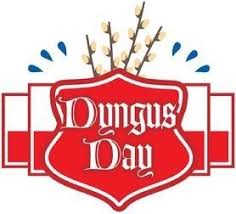Dyngus Day
In 2024 Dyngus Day or Easter Monday is on the first of April, also known as April Fools’ Day. Falling but one day after Easter April Fools’ Day in 2024 is a day for laughter and joy as every sorrow is conquered by Christ’s triumph! On April 1st 1656 Mary was proclaimed the Queen of Poland so it is fitting that Dyngus Day falls on this date in 2024.
Today is the 2nd day of the Easter season. Due to the great solemnity of Easter, many cultures have special practices today, the most popular being Dyngus Day for those of Polish descent. Therefore, people wear red today for the red of the flag of Poland.
Today is the 2nd day of the Easter season. Due to the great solemnity of Easter, many cultures have special practices today, the most popular being Dyngus Day for those of Polish descent. Therefore, people wear red today for the red of the flag of Poland.
The Catholic Church calls today the Monday of the Angel to recall the Angel who proclaimed the Resurrection of Christ.
As Easter is the cornerstone of our faith, we celebrate it as a season until Pentecost and after that, each Sunday of the year and always in our hearts, Easter is our joy!
EASTER WEEK AROUND THE WORLD
In some cultures women will be hoisted in the air today and on Tuesday, it’s the men’s turn. The chairs they are lifted on are beautifully decorated and while hoisted in the air “Jesus Christ is Risen again!” is chanted. The hoisting is sometimes rewarded with a kiss. Some cultures will practice what is similar to trick or treating in the U.S for Halloween today, known as pace egging pace comes from the word for Easter, Pascha.
The word dyngus may come for a German variation of the word "ransom" or "the eggs that are owed", as the ransom for protection from pusswillows and dousing was to offer Easter eggs.
The switching with pussy willow branches (used in place of palms for Palm Sunday when they’re not native, such as in Poland) is meant to bring good health and ward off evil, I’ve read that the pussywillow recall Christ’s flogging. The water that is used to douse each other on Dyngus day is to honor the baptism of the Prince of Poland, bringing Catholicism to their country. In some cultures dousing on this day is rewarded with treats. When dousing you’re supposed to cry out “smigus” (schmeegus).
The switching with pussy willow branches (used in place of palms for Palm Sunday when they’re not native, such as in Poland) is meant to bring good health and ward off evil, I’ve read that the pussywillow recall Christ’s flogging. The water that is used to douse each other on Dyngus day is to honor the baptism of the Prince of Poland, bringing Catholicism to their country. In some cultures dousing on this day is rewarded with treats. When dousing you’re supposed to cry out “smigus” (schmeegus).
Today some cultures visit the sick or travel, recalling the walk to Emmaus when Jesus revealed Himself to His disciples.
Today, in Italy foods similar to those eaten at Passover are eaten.
This week is called the week of chimes in Russia because of the tolling of church bells praising the Resurrection of Christ.
(See this link throughout the Octave and season of Easter)
Brief Polish History
Resources: Encylopedia of Easter and https://en.wikipedia.org/wiki/%C5%9Amigus-dyngus





Comments
Post a Comment